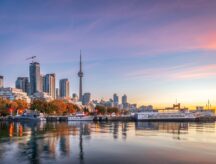What you need to know when coming to Canada from the U.S.
If you’re looking to come to Canada from the U.S., make sure you know what you need to do beforehand and which port of entries are currently open.
In March, Canada put in place travel restriction measures to slow the spread of COVID-19. Canada and the U.S. also announced an unprecedented border closure between the two countries that have since been extended until August 21.
However, some people are exempt from these travel restrictions including:
- Canadian citizens;
- Permanent residents;
- People registered under Canada’s Indian Act;
- Protected persons;
- Immediate family members of Canadian citizens or permanent residents;
- Spouses and common-law partners;
- Dependent children;
- Grandchildren;
- Parent or step-parent;
- Guardians or tutors; and
- Some temporary foreign workers.
Find out if you are eligible for any Canadian immigration programs
Canadian citizens and permanent residents
If you are a Canadian citizen or permanent resident, you must be prepared to quarantine for 14 days and have a quarantine plan.
Upon arrival, if you are showing symptoms of COVID-19, you will be referred to an officer from the Public Health Agency of Canada. You will then be requested to isolate from others for 14 days.
Immediate family members
If you are an immediate family member of a Canadian citizen or permanent resident travelling from the U.S., you must not be showing symptoms of COVID-19. In addition, you must be staying in Canada for at least 15 consecutive days. If you are planning to stay less than 15 days, scroll down to the All other foreign nationals section below. You are expected to provide evidence that you are indeed an immediate family member.
You must also have a quarantine plan.
Temporary foreign workers
Upon arrival in Canada, you must prove that you have a valid work permit or approval letter, and a proof of employment at a Canadian business.
If you do not have a work permit but are employed at a Canadian business, you may be able to apply for a work permit at a port of entry. You must also not be showing symptoms of COVID-19.
All other foreign nationals
If you are not a Canadian citizen, not a permanent resident and not considered an immediate family member (or are planning to stay in Canada for less than 15 days), you must prove that you are travelling to Canada from the U.S. for an essential purpose. You must also prove that you have no symptoms of COVID-19 and have a quarantine plan.
If you are looking to transit through Canada to travel to Alaska, you must follow additional rules.
Travelling to Canada Checklist (applicable to all travellers)
Everyone travelling to Canada, including Canadian citizens and permanent residents, must do the following:
- Wear a non-medical mask throughout your trip, if travelling by air.
- Be prepared to pass a health check before you board your flight if travelling by air.
- Download the ArriveCAN mobile app on your phone and provide basic information. If you do not wish to download a mobile app, you may do this using an online form, or a paper form.
- Be prepared to pass a health check by a border services officer or a quarantine officer upon arrival in Canada.
- Have a plan to quarantine for 14 days.
- Make sure you arrive at an operating port of entry.
Quarantine plan
All travellers to Canada are required to have a plan to quarantine for 14 days. This is mandatory. This plan should include where you are going to stay, how you will travel to your place of quarantine, how you will be getting groceries, and how you will access other services including healthcare.
You must make sure that you do not come in contact with anyone over 65 years old, anyone with underlying health conditions or weak immune systems. You must wear a non-medical mask on your way to your place of quarantine.
You are required:
- to go straight to your place of quarantine without stopping;
- to not leave your place of quarantine, unless you need medical attention;
- to not welcome any guests; and
- to not use any outdoor spaces unless they are private.
If you develop symptoms of COVID-19, contact your local public health authority, and extend your 14-day quarantine period to the day you developed symptoms.
If you are a Canadian citizen or permanent resident and are showing symptoms of COVID-19 upon arrival in Canada, you will be requested to self-isolate.
This means that you are required to follow all the quarantine rules. In addition, you must use private transportation, such as your car, to travel to your place of isolation from the port of entry. You are prohibited from using any outdoor spaces, and you must regularly clean any common areas in your place of isolation. If your condition worsens, contact your local public health authority.
Ports of Entry
Before you travel to Canada, you are advised to check which ports of entry are operating. This webpage on the Canadian Border Services Agency website lists all open ports of entry and what services they currently provide.
Find out if you are eligible for any Canadian immigration programs
© 2020 CIC News All Rights Reserved
- Do you need Canadian immigration assistance? Contact the Contact Cohen Immigration Law firm by completing our form
- Send us your feedback or your non-legal assistance questions by emailing us at media@canadavisa.com







